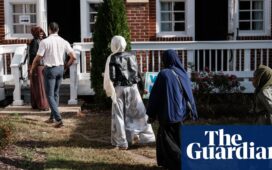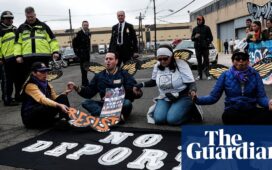JCR had been a cook for 15 years, never struggling to find a job in New York city, where his friends would always find a place for him in a restaurant’s kitchen.
But when Covid-19 hit the city in March last year, work that immigrants had relied on vanished seemingly overnight, especially jobs in hospitality, events and cleaning.
While the restaurant industry in the city is now in recovery and struggling to re-employ workers it had laid off, jobs were extremely hard to find last year, JCR says.
After he lost his job he could not find another one in the food industry as the city became the global epicenter of the disease. “Only essential or very experienced workers were being hired,” he realized.
Many of his friends in the restaurant industry moved to construction, and there he finally got a part-time gig after months of searching.
JCR’s experiences are similar to thousands of immigrants from Latin America – and one that Documented, a local newsroom that covers immigration in the area, was able to quickly identify via its WhatsApp service, a Spanish-language channel that provides undocumented New Yorkers with valuable information.
Last August, five months into the pandemic, the newsroom asked its undocumented readers how they were dealing with the Covid-19 crisis and as dozens of answers started to pour in, some common struggles became evident.
The questions about places to find food or ways to get economic help became more and more frequent, said Mazin Sidahmed, co-executive director of Documented.
“From the messages, and interviews we were doing, we could see all too clearly just how difficult the pandemic has been for what is already a vulnerable group – and one which US cities like New York rely on for so much.
“The struggles have been heartbreaking, and the resilience has been heroic.”
A sample of the messages over the year (names have been abridged or changed):
-
“I’m an undocumented Dominican working at two restaurants. When the pandemic started, both closed and haven’t reopened. I’ve been unemployed for four months now and I can’t pay rent. I look for food at pantries and that’s why we haven’t starved, but I haven’t gotten any help for the rent,” AM said.
-
“I didn’t have a job any more and I don’t have an income. Since I’m undocumented, I don’t qualify for any type of assistance,” wrote LP.
-
“I lost my job. I had to be very careful because I was pregnant. I had some savings at first but I ran out of those,” G said.
Inspired by the dozens of submissions, Documented created a short film on one immigrant’s experience. The film, I know what pandemic means, was created with the production company Waterwell, and directed by Frisly Soberanis, a film-maker from Queens, New York.
Bills mounted amid Covid-19 health threat
Without a job or any type of income, many undocumented Latin American immigrants have struggled with rent payments, electricity and phone bills and other expenses. It took until last April for New York to announce special aid for immigrants. Named the Excluded Workers Fund, this assistance is expected to benefit 290,000 people according to the Fiscal Policy Institute – a number considerably below the 560,000 undocumented migrants estimated to live in the City.
R tried to live through the worst months of the pandemic by selling food in her own house. Originally from Peru, R is proud of her home country’s specialties and started serving those.
But the super in her building told her to stop.
“We’re really scared. We’re scared to go out and sell food. Because maybe immigration is going to be there. So we can’t do anything. And that’s our fear. We want to move on with our lives and survive,” she told Documented in an interview.
Unemployment rates skyrocketed across all groups in the US when Covid hit, but the effect of the pandemic was particularly devastating among immigrant women like R, research by the Migration Policy Institute showed in June 2020.
“Initial job losses have been exceptionally high among immigrants, particularly Latinos,” the report concluded.
On top of the economic hardship, immigrants had to deal with the virus itself. If they had Covid, they wouldn’t go to a hospital. Some of them suspect they contracted the disease, but aren’t sure. They weren’t able to afford medical care at that time. Health insurance has never been common among undocumented immigrants in the US. In 2020, right at the beginning of the pandemic, the Kaiser Family Foundation reported that four in ten undocumented foreign-born individuals were uninsured compared to less than one in ten citizens.
Moreover, changes to immigration policy under the Trump administration were contributing to growing fears among immigrant families, the same research showed.
That was the case of MC, who got infected but refused to leave her house. “People were dying and I was afraid because I was an immigrant. And if I died, I wanted to die in my house and be close to my children,” she said.
Eventually, she got better. She doesn’t know how she got sick, but suspects it was through her husband. Some of his coworkers had died from the virus. That must have been the only way, she thinks, the virus breached her house. “I never left. I didn’t go outside. I was scared,” C said.
She still is.
For undocumented immigrants in New York, the fear of a mortal pandemic added to the everyday anxiety on their status. And it took a toll. For C, that meant being unable to do anything outside of her house. Even grocery shopping could cause her panic. “If I was going out to buy food and I saw a lot of people in the store, I wouldn’t go in. My head would start to hurt. I didn’t want to go inside,” she recalls.
Kindness
In its callout, Documented also wanted to know what kept Latin American immigrants going through the hardest months of the pandemic in New York. And so emerged stories like the landlord who cut 50 percent of the rent amount, the priest who would provide online support, the friend who would give food to someone with Covid. Names change in the messages, but many words remained the same: brothers, sisters, family, neighbors, God.
For C, it was her children. “I saw them and I said, no, I have to keep going. I have to keep going for them.”
For a community whose members have faced different crises in their home countries and left those searching for a better future, it seems there is always hope –even amid the worst moment of the pandemic. “We have been through so many things. Come on, life isn’t easy, but you have to stay positive,” one of the Documented readers said in his message.
“I also had to be strong for my children,” R told Documented. Her son coped with anxiety, shaking at night, without sleeping. She says he still feels that fear in his chest. When that happens, she tells him to relax, to think of something else.
“I make tortillas and I try to give him incentives. I say, ‘Let’s keep going. This pandemic is not going to beat us, my son.’”








